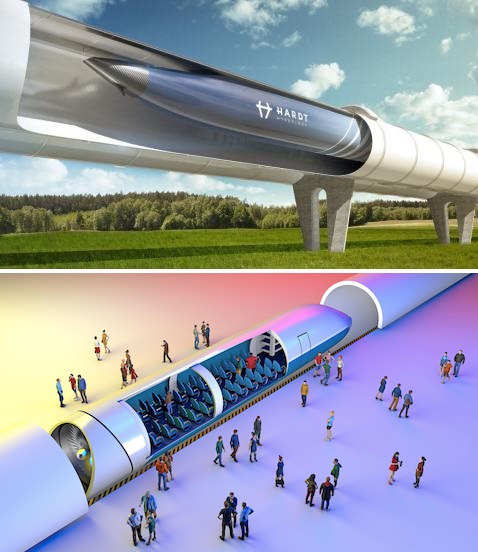[video] A futuristic transport technology is born in the Netherlands
Nestled alongside a railway line in the windswept northern Netherlands lies a 420-meter white steel tube that is used to test a futuristic transport technology – a hyperloop capsule to shuttle both people and freight.
This 2.5-meter diameter prototype forms the nucleus of the European Hyperloop Center (EHC) in Veendam, the Dutch province of Groningen, which was inaugurated on 27 March 2024 to serve as a testing ground in the coming years for development of this transformative technology.
More to read:
[animation] Ancient Greeks were first to build a railway
The test center's tube comprises 34 distinct sections. A vacuum pump, housed in a steel container adjacent to the tube, evacuates air to lower internal pressure, minimizing drag and enabling capsules to achieve high speeds.
The capsule’s current speed is 75 kilometers at turn and 100 kilometers in straight line, the operator said on the pipe’s official website.
The EHC is an open innovation and testing facility where companies, industry, and science work together on the development of the European hyperloop.
The test track will be open to any company and knowledge organization who wants to develop, demonstrate, and/or validate their (sub)system for the hyperloop or related technologies, the EHC noted.
Sascha Lamme, director of the center, anticipates the debut of the first operational hyperloop route by 2030, possibly spanning five kilometers (three miles) and carrying passengers.
Hyperloop, once championed by American billionaire Elon Musk, envisions capsules floating on magnetic fields hurtling through low-pressure tubes at speeds nearing 700 kilometers per hour or 435 miles per hour. Advocates extol its potential as a significantly more efficient alternative to short-haul flights, high-speed rail, and freight trucks.
More to read:
[video] Abu Dhabi offers free rides in driverless taxis
However, since Musk first unveiled the concept, envisioning a 30-minute journey between Los Angeles and San Francisco covering nearly 400 miles (645 kilometers), progress from the conceptual stage to practical implementation has been modest.
The European Hyperloop Center is a not-for-profit organization, structured as a Foundation, located in Groningen – the Netherlands, to accelerate the hyperloop development. Founded in 2020, the EHC is a public-private initiative by the Province of Groningen, the City of Groningen, and Hardt Hyperloop.

The vision of the Hardt Hyperloop engineers. Credit: Hardt Hyperloop
EHC is part of the Hyperloop Development Program, a public-private partnership between the Dutch Ministries of Economics & Climate and Infrastructure & Water Management, the Province of Groningen, and a group of industry parties and knowledge and research institutions.
More to read:
Stargazer, a rocket-powered passenger aircraft reaching Mach 9 speed
Multiple companies across Europe have been involved at present in hyperloop development. The Netherlands’ Hardt Hyperloop (the pioneer in Europe), Spain’s Zeleros and Poland’s Nevomo are making significant advances. Preparations for similar tracks are already underway in countries like Italy and India.
The fully-electric capsules are expected to gradually replace the fuel-powered trains in Europe within a decade, according to plans.
The EHC has published a video on its YouTube channel about the kick-off event.
***
NewsCafe is a small, independent outlet that cares about big issues. Our sources of income amount to ads and donations from readers. You can support us via PayPal: office[at]rudeana.com or paypal.me/newscafeeu. We promise to reward this gesture with more captivating and important topics.







